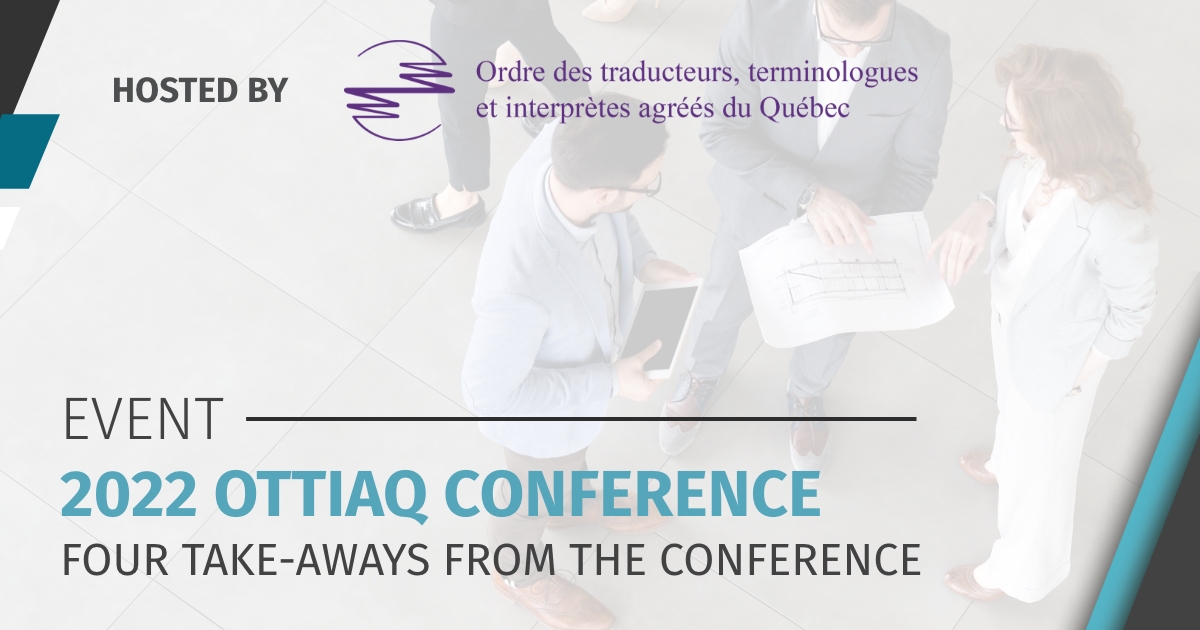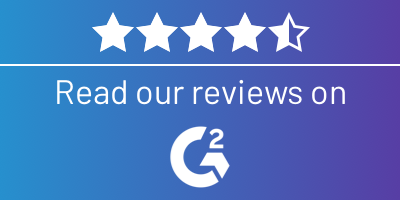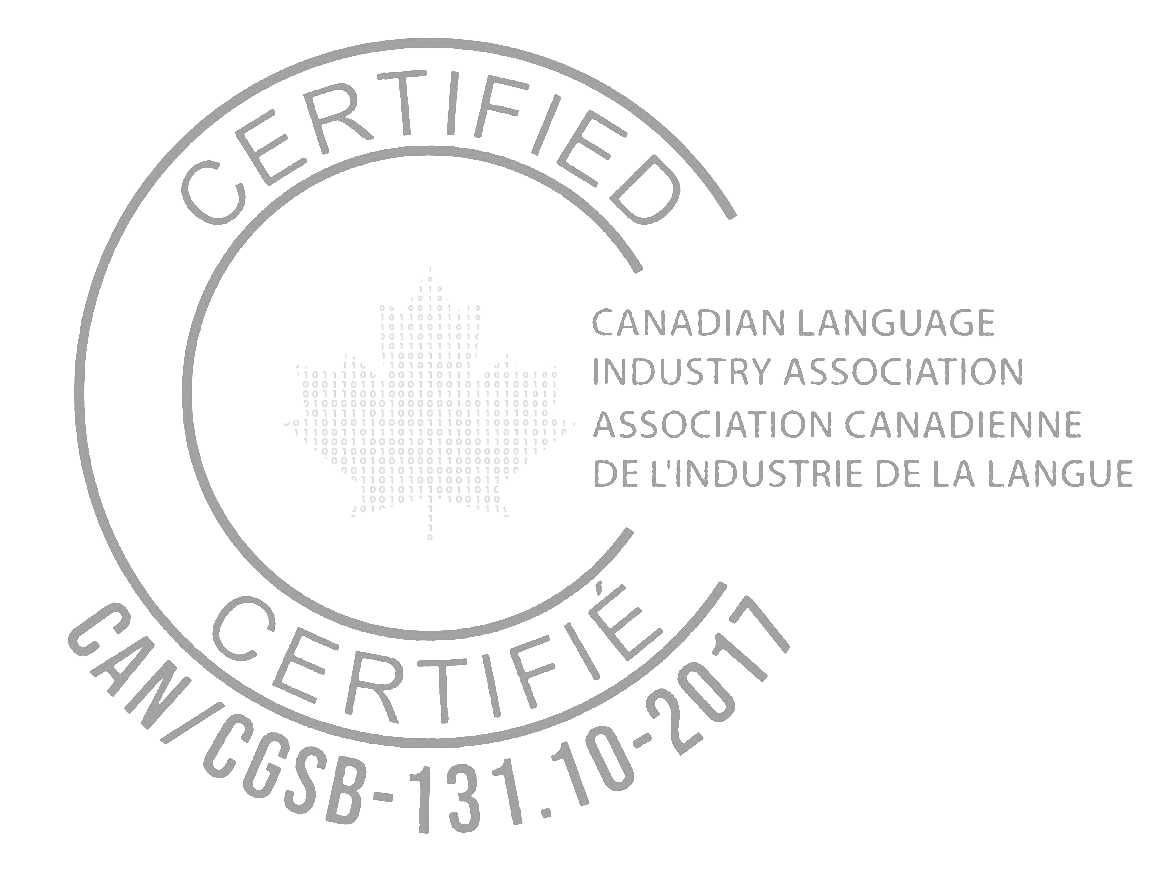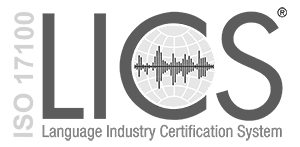Welcome back, OTTIAQ!
2022 OTTIAQ Speakers Ann Marie Boulanger & Joachim Lépine.
After two years of virtual conferences, the most important event of the year for Quebec’s translation community was back in fine form on Friday, October 14th, at the Palais des congrès de Montréal for its 2022 convention.
The content was certainly varied, covering a range of topics and challenges facing our industry. How do we evolve our writing to be more inclusive? How does misinformation impact our work? What is the best way to approach the ethical issues facing our society? Whether on the big stage or in side conversations over a cocktail, these were just some of the issues being discussed during the conference.
Yet, in spite of the challenges we face, there was talk of opportunity. From Donald Barabé’s and Patrice Roy’s opening speeches to Thomas Mulcair’s closing remarks, the event was a reminder of the incredible progress made by our entire industry.
Two speakers from the event, Joachim Lépine, M. Ed., and Ann Marie Boulanger, MA, are certified translators who are also known for their JAM newsletter for translators and LION Translation Academy. We asked them what they thought the key takeaways were from the OTTIAQ conference.
Here is what they shared with us…
1) Inclusive Writing is More Important than Ever
It will come as no surprise that the idea of inclusion is evolving at a rapid pace. While many of us are doing our best to be more inclusive, there is still much dialogue and discussion needed to ensure equity, diversity, accessibility and inclusion in our communications.
“The breakout session, Inclusive Writing and Vocabulary, presented the new Guide on Equity, Diversity and Inclusion Terminology from the Government of Canada,” explains Lépine. “It’s a handy bilingual reference for all Canadian translators.”
Interested in leveraging this guide for yourself? Click here to access The Guide on Equity, Diversity and Inclusion Terminology: an essential tool.
2) Don't be Afraid of Neural Machine Translation (NMT)
“Don't be afraid (or ashamed!) to use neural machine translation (NMT),” advises Boulanger.
There is a stigma about the use of artificial intelligence (A.I.) and machine translations in some circles, which can hold back translators and translation teams from providing the best possible solution to their clients.
“[NMT] is a great way to help meet the demand and provide added value (in the form of faster turnaround times) to clients, at no extra charge to them,” continues Lépine, “Where else are they going to find that kind of value?”
Alexa Translations’ MJ Gagnon with translation guru Betty Cohen at the 2022 OTTIAQ Conference.
3) There are Ethical Considerations when using Neural Machine Translation (NMT)
Anyone who has ever translated English content for francophone Canadians knows of the challenges it entails. And anyone who is aware of the recently passed Bill 96 understands the volume and complexity of translations are likely to increase. For these reasons, many companies are flocking to companies such as Alexa Translations that offer A.I. translation solutions, allowing them to become more scalable.
What we don’t all realize is that there are ethical considerations to using such tools.
“We learned about the profound importance of collaboration, satisfaction, respect and control in NMT workflows,” says Lépine, “and [we] even talked about some of the human rights issues that this technology brings into play.”
The use of NMT is likely to continue to rise, so it is critical that we understand the potential challenges for clients, translators and, of course, the audience.
4) Respect for Our Differences has a Huge Impact
Thomas Mulcair is no stranger to differing opinions. As the former leader of the New Democratic Party and former leader of the Opposition, he has been at the centre of some of the most heated debates in recent Canadian politics. Perhaps it is this unique perspective that inspired his closing comments for this year’s OTTIAQ conference.
“Thomas Mulcair spoke of his admiration for translators, terminologists and interpreters as professionals who are keen to know and respect differences and who seek to understand the other,” describes Boulanger. “He also urged audience members to be open to each other and to get to know their neighbours as a way to promote deeper understanding between cultural and linguistic communities.”
How timely this message is, considering the challenges related to Quebec’s recently passed Bill 96. Supporters and opponents alike are all watching with bated breath as the highly contested bill winds its way through the courts. Discourse is heated, to say the least. But perhaps Mulcair’s comments were the perfect message to remind us that understanding one another can help bridge our divides.
Looking Forward
There were many other incredible speakers and topics that rounded out OTTIAQ’s triumphant return to in-person conferences. We’re already looking forward to next year. Thank you to everyone who contributed to the event!
Joe Lépine and Ann Marie Boulanger are certified translators who help others in the translation industry excel in their careers and adapt to emerging technologies. Would you like to learn more? Click here to subscribe to their email newsletter.
Looking for a stellar translation service backed by domain and language experts? Learn more here.














